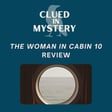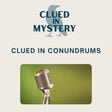Become a Creator today!Start creating today - Share your story with the world!
Start for free
00:00:00
00:00:01

Modern Great: Mick Herron
If you've watched Slow Horses on Apple+ TV, you have enjoyed Mick Herron's story telling. He is the 2025 Diamond Dagger recipient, and in this episode, Brook and Sarah discuss his impact on the mystery genre.
Discussed and mentioned
Down Cemetery Road (2003) Mick Herron
Slow Horses (2010) Mick Herron
Dead Lions (2013) Mick Herron
For more information
Instagram: @cluedinmystery
Contact us: hello@cluedinmystery.com
Music: Signs To Nowhere by Shane Ivers – www.silvermansound.com
Sign up for our newsletter: https://cluedinmystery.com/clued-in-chronicle/
Order Life or Delft by Brook and Sarah
For a full episode transcript, visit https://cluedinmystery.com/modern-great-mick-herron/
Transcript
Introduction to Mick Herron
00:00:12
Speaker
Welcome to Clued in Mystery. I'm Sarah. And I'm Brooke, and we both love mystery. Brooke. Hi, Sarah. Today, we're going to discuss another modern great.
00:00:28
Speaker
That's right. And we are going to discuss Mick Herron, who earlier this year was awarded the Diamond Dagger from the Crime Writers Association.
00:00:40
Speaker
So I will give us a little introduction and then I look forward to speaking about his career with you.
Herron's Early Writing Career
00:00:47
Speaker
Mick Herron spent his early years living with his parents, a nursery school teacher and an optician, and five siblings above his father's optician's shop in Newcastle-upon-Tyne.
00:00:58
Speaker
After earning a degree in English from Oxford, he settled in that city and commuted to London for work as a sub-editor of an employment law journal. It was during that commute that he began writing what would become his first novel, Down Cemetery Road, which was published in 2003 and features Zoe Beam, a private detective.
00:01:18
Speaker
After writing four novels in that series and releasing a standalone novel, he shifted his focus to the British spy services and wrote Slow Horses. Released in 2010, the book sold poorly and his publisher declined to release the second book.
Impact of Apple TV Adaptation
00:01:33
Speaker
His agent, however, persuaded the U.S. distributor to publish that book, and it ended up earning the Crime Writers Association 2013 gold dagger. He continued writing and commuting, and it wasn't until around the time of the fourth book in the series, when that was published, that he quit his job to write full time.
00:01:54
Speaker
Apple Plus eventually picked up the TV rights to both series and Slow Horses hit the streaming service in April 2022 and introduced viewers to Jackson Lamb. I would argue that this is some of the best content on screen right now, and I am sure I'm not alone in saying that I am looking forward to the Zoe Beam series later this month.
Unique Style and Recognition
00:02:15
Speaker
Throughout his career, Perron's writing has been recognized with Slow Horses long listed for the Ian Fleming Steel Dagger in 2010 and several subsequent books in the series shortlisted or winning the same award.
00:02:28
Speaker
And the second book in the series, Dead Lions, won the Crime Artists Association Gold Dagger in 2013 for Best Crime Novel. And as with ah Slow Horses, other books in that series either were shortlisted or won that same category.
Character Dynamics in Slow Horses
00:02:44
Speaker
And as I mentioned at the beginning, he received the Diamond Dagger this year for lifetime contribution from the Crime Writers Association. And in 2024, he was appointed to the Royal Society of Literature.
00:02:59
Speaker
So, Brooke, I think McCarran is our first modern great who is still writing. Have you had a chance to read anything of his?
00:03:10
Speaker
Well, first, thank you so much for that summary, ah Sarah. i You found some tidbits and nuggets about his life that I wasn't able to track down. So that was really, really fun to learn about.
00:03:22
Speaker
Yes, I am in the middle of slow horses now. And I've told you before that we don't have Apple TV. So I'm so jealous that you have always talked about how great the series is.
00:03:35
Speaker
And now I'm reading um the first book and
Humor and Realism in Spy Stories
00:03:38
Speaker
I'm about halfway through. Oh, that's so great. So I hadn't read any of his books until 2022 when the series aired on on Apple TV.
00:03:49
Speaker
And actually, I don't think it was until maybe 2023 or even ah last year that I started reading the series. I have to say it is adapted so well. It really sticks true to the source material And I'm curious to hear what you think about the characters having not seen them on screen.
00:04:13
Speaker
Oh, that's great. Yeah, that's a fun contrast. um Well, I i think that the setup is so refreshing because unlike any other kind of spy fiction,
00:04:26
Speaker
you know, these guys are not the perfect 007 where they can do no wrong. They can, you know, everything 007 says is perfect. Every action he makes.
00:04:38
Speaker
ah These are the cast offs, essentially. They're the misfits. And I think it's wonderful to think about the fact that every industry has these you know There's this subset that they're not the stars, and yet they still, of course, ah can do heroic things.
00:04:59
Speaker
And
Character Development and Descriptive Style
00:05:00
Speaker
so I really enjoy that. In starting a new series, sometimes it takes... a long part of the book before you start to identify names and characters and like you start to place them in your head. And especially because I listened to this, I am listening to this in audio and I do so very often.
00:05:20
Speaker
It's sometimes hard to keep characters straight, but I have not had that experience at all. in Slow Horses. He does a really good job of delineating characters. um And I can't really put my finger on how he does it, but I know very clearly who's who.
00:05:37
Speaker
Yeah, that's a great observation. they are very interesting. as you say, very distinct, each character. i think he just must assign, this is the the way that this character speaks or this character moves or acts. And and and so just builds on that.
00:05:56
Speaker
The books are, I think, very um descriptive. it's It's very easy to picture kind of where the characters are, but they're also really funny.
00:06:08
Speaker
Very funny. Yes. And I read that one of the reasons why book two wasn't picked up is that people were having a hard time deciding. I thought this was funny. They didn't know if this was a comedy or a drama. And I thought, okay, I don't think it goes clear to the level of comedy. it's It's strange to think of a lighthearted spy thriller, but there are moments of levity and there, you know, I find myself laughing out loud.
00:06:35
Speaker
Yeah. Yeah. and And it's not funny. Like, it's not farcical, right? So we're not talking about Get Smart, or, um you know, something along those
Office Dynamics and Relatability
00:06:46
Speaker
lines. It's, it this is serious, right? It's a serious book.
00:06:53
Speaker
But there is just this You have to ease some of that tension. And he does that with and primarily with Jackson Lamb and the way that he just treats everybody else. He's just this horrible, horrible character in terms of the way that he interacts with the people who work for him, the people he works for.
00:07:17
Speaker
He's he's just rude. Yes, absolutely. And Aaron talks about the fact that he's essentially talking about life as an office worker.
00:07:28
Speaker
These people don't want to be office workers because they used to be MI5 spies in the action, but now they're basically paper pushers. And he's, he has said like, I know a lot about that because I've worked in offices and I know what it's like for people to not be satisfied with their work. And so it's just putting that into, you know, the spy world and,
00:07:53
Speaker
And there is a lot of office humor. I mean, there's a lot of that. And that, you know, chatting around the water cooler and you're everybody's poking fun at the boss or whatever. And you get that feeling and you you have to remember like, oh yeah, people in every job description do this, whether or not they want to be there or not.
00:08:14
Speaker
And I think that's part of the real appeal of the series, right? Is that I am not a spy. I am never going to be a spy. I don't know what that work is like. But I, as you say, i do know what working in an office is like. And so I can identify with those experiences that the characters have.
00:08:33
Speaker
And so I think that's that's part of part of the appeal. I did read an interview where he was quite clear that the experiences that he gives to his characters with respect to having this horrible boss, that that is not an experience experience that he shares with them.
00:08:53
Speaker
But, you know, I think in at his work, working on this law journal, um he would have seen lots of examples of very bad bosses.
Herron's Approach to Spy Fiction
00:09:03
Speaker
And you said, Sarah, that you don't know anything about being a spy. And of course, neither do I. And Heron even says that he would make an awful spy. He doesn't own a smartphone and he doesn't have Wi-Fi at home, which is a little ironic considering what he writes. But I thought that was a really unique ah fact about him.
00:09:24
Speaker
Yeah, I saw that as well. And he does make a point of in interviews saying that, yeah you know, i I am not a spy. And I've made up all of this. This is fiction, right? And and I don't think he necessarily wants to be 100% accurate with respect to the way things work, because he just wants to write about this world that he's he's created.
00:09:54
Speaker
Right. Yeah. The New Yorker did call him the heir to John Le Carré and the best spy novelist of his generation. But unlike Le Carré, Heron never worked in intelligence, so like you said.
00:10:09
Speaker
And he approaches it from the outside looking in. And so I think it's really high honors to be associated with um you know his predecessors in that way.
00:10:22
Speaker
But it it is coming at it from a different angle. And um I find it more accessible and enjoyable.
Non-linear Writing Process
00:10:29
Speaker
Yeah. Yeah, I agree. and We have talked before about people who are experienced in a particular profession, then writing about characters with that similar background as the sleuths.
00:10:44
Speaker
And there's a risk that you're going to weigh down the story with details that, of course, you know, because you're an expert in this field, but aren't necessarily things that push the story forward. And we don't get any of that.
00:10:59
Speaker
with Heron's writing. So Sarah, in your research on Mick Heron, did you discover any information on how he writes and how he puts together his stories?
00:11:10
Speaker
Yeah, I did. I found a couple of interviews where he talks a little bit about that. He is not very much of a plotter and he admits to that. He says, a certain number of plot points are embedded in the novel before I start writing it.
00:11:24
Speaker
Occasionally, a particular twist is the reason for writing a book in the first place, but I don't plot a book manually before writing it. And a lot of changes take place along the way. So some of those twists will have occurred to me at about the same point in the novel that they're dropped on the reader.
00:11:40
Speaker
Oh, that's wonderful. And then in another article, he said, um i wish I could more adequately plan. He says, I have a vague notion of what I'm up to. I know what scenes I'm writing, which characters are involved, but the planning tends to happen on the page.
00:11:56
Speaker
Often what might appear as a clever plot twist is really when I've written myself into a corner and I need to get myself out of it.
00:12:05
Speaker
I can relate to those notions that he expresses because I too am not much of a planner when I'm writing. I identified with that as well.
00:12:17
Speaker
i was struck by really how relatively short his career has been to reach the heights that it has. I mean, Slow Horses was published in 2010.
00:12:32
Speaker
So his first series was just published in the early 2000s, making his career really only about 20 years long as far as publishing.
TV Adaptation and Reader Engagement
00:12:45
Speaker
And then to you know get the Diamond Dagger and get these awards, it's really quite short in comparison to some of the other people that we talked about that maybe didn't reach that ah level of success until 2000.
00:12:59
Speaker
30 or 40 years into their career. Well, and and I think he credits that with just having some good fortune come his way. So when his, when the second book in the Still Horses series wasn't picked up by his British publisher, I think he just was like, well, I'll just keep writing these because I like the stories, right? And I'm enjoying them. and And this is a fine way to pass the time on the train between Oxford and London.
00:13:31
Speaker
ah and And he talks about this in an interview. didn't pull out a quote, but he does talk about that he was fine with that, right? Like that that was, he had accepted that that he was never going to be a bestseller.
00:13:45
Speaker
And then it it just was, you know, his book catching the eye of the right editor or the right person that got it into the hands of someone else that kind of started this chain reaction and ended with,
00:13:59
Speaker
the series on on Apple TV. um And he in all of the interviews that I read with him, he just seems to be this very down to earth, humble, even guy who just loves writing and is thrilled that people are enjoying his
Appeal of Slow Horses for TV
00:14:24
Speaker
stories. So I read the first book in the Zoe Beam series and It's also very good, right? Like it it doesn't feel like a first novel. It'll be really interesting to see how it's adapted because it was written, um i think it was
00:14:42
Speaker
you know probably written or so he's probably started writing it very early 2000s and so if they don't set it then if they send set it now there's some changes that they can make to just acknowledge the state of the world that we're in it it's also good it doesn't read you know sometimes a first novel reads like a first novel and and this did not even reading still horses it's hard to see why it wasn't immediately successful because it I think it is so good.
00:15:16
Speaker
Mm-hmm. Mm-hmm. And I do think there's a little bit of that, how is this a spy thriller with the levity, which we talked about earlier? Yeah. I think that it was a different time, and maybe now we're a little bit more used to stories that have a little bit more of that personal touch, and we get to see the inter um interactions more intimately of the characters.
00:15:42
Speaker
That feels like something kind of now. And, you know, maybe 10, 15 years ago, we weren't really ready for that. Because I agree, like reading it as the first time now, i I'm thinking i'm I'm surprised that this just wasn't just runaway hit off the bat.
00:16:01
Speaker
Yeah, I think that's a really good point, Brooke. It just might not have been the right time. And it probably wasn't positioned right. Mm hmm. um So when that ah second book came out um and his US publisher submitted it for the Crime Artists Association Award, I think that did give him a little bit of of recognition. Yeah.
00:16:27
Speaker
it it won the best crime novel award, which is a ah very prestigious award to win. and then you look at the list of all of the awards that his books have been nominated for and and that they've won.
00:16:42
Speaker
i think the people who read them recognize them as being very, very good. It probably just wasn't positioned the right way to attract readers attention.
00:16:53
Speaker
Right. The correct audience for, for book. the book um I will say, and reading it now, I already know that the television series exists.
00:17:06
Speaker
So um even though I haven't seen it, I'm aware that it exists.
TV Storytelling Influence
00:17:12
Speaker
The first few chapters in my mind were like written for television because you're introduced to each character one at a time, very much like when you're watching a series, it's like, okay, here you're meeting them the main male character and here's the main female character, you know, for instance.
00:17:33
Speaker
And, and then, when they finally all, you all see them in the ensemble room together. he I'm sure he wasn't doing that intentionally, but I could see how adapted really well to the screen.
00:17:48
Speaker
um And I will also say that not a lot happens in the first quarter of that book because you're just like meeting each person and you're learning about their background. And that could have been a turnoff um for audiences as well. I don't know.
00:18:03
Speaker
um Because it's not fast-paced 007 shooting guns and you know driving fast cars. it You're finding out about these people's internal lives. And then it culminates into you know what happens that they all have to work together.
00:18:20
Speaker
Yeah, you're right. i it It may... it may be an example of something that needed that ah television treatment to attract readers.
00:18:34
Speaker
Um, anyway, I, if you ever get the chance, Brooke, I do highly, highly recommend that you watch the series because I'm sure you will just absolutely fall in love with it. And each, um,
00:18:47
Speaker
series is only or each season is only about six episodes. So it's not, you know, it doesn't drag out too
Opposition to Continuation Novels
00:18:56
Speaker
much. It's it's it's perfect in terms of the amount of content, I think.
00:19:01
Speaker
So, Brooke, you earlier mentioned the comparison that has been made between McCarran and John le Carré. And that we've talked before where other authors have taken up a story and and continued it, whether it's with Sherlock Holmes or James Bond.
00:19:18
Speaker
And um McCarran has a very firm stance about continuation novels. I would do everything in my power to prevent any such thing ever happening.
00:19:31
Speaker
It fills me with horror. I don't see why it's so hard for publishers to accept that there's dangers in trying to extend the life of a series, turning it into a franchise rather than the creation of a particular author.
00:19:44
Speaker
It's part of the commodification of literature, which is one of the least attractive aspects of it. And he said he would never accept an offer to write a Bond novel.
00:19:56
Speaker
How fascinating. I mean, you have to respect that, right? You have to understand where he's coming from. and And I do. I get that and that idea of the um it being a commodity and just a commercial endeavor. I really respect his that stance.
00:20:15
Speaker
And this is coming from someone who has commercialized his own work, yeah But the idea of then somebody else capitalizing it on it is he calls it like a horror.
00:20:27
Speaker
Yeah.
Expanding Series Through Short Stories
00:20:28
Speaker
Yeah. I thought it was a really interesting um position to be so firm about. And we've talked before about some authors, you know, Sue Grafton not wanting even television version of her um of her series and having having died without finishing her series. And so that's an example of something that would be ah very easy thing to to finish up.
00:21:05
Speaker
But because she was so adamant, you know, I don't think we will ever see ah conclusion to that series. Yeah, I agree. Yeah. And I would imagine that Sue Grafton and Mick Heron would be on the same page of this ah conversation.
00:21:26
Speaker
Yeah, I i agree.
00:21:30
Speaker
i will mention that he has written several short stories, as well as some novellas that are standalone and some that are in the slow horses world.
00:21:41
Speaker
ah And so, if you know, there's some that provide a little bit of backstory about some of the characters or you know, you know, meet them before you meet them formally in the series.
00:21:52
Speaker
And I always enjoy when authors do that. I think that ah that is such a,
00:22:00
Speaker
it's such a treat as a reader to just get that little bit more. And I appreciate that he doesn't stretch that out into a whole novel, but he just tells a little bit of information that keeps the reader engaged in the world.
00:22:17
Speaker
yeah I think so too. It feels like you're getting peek inside their process a little bit, you know, it almost like you're seeing the the behind the scenes information and and there they can be a lot of fun.
00:22:33
Speaker
hu Well, Sarah, thank you for doing this research. And so we can learn a little bit more about Mick Heron, a modern great It was a lot of fun, Brooke, and it was a lot of fun to chat about him with you. And like I said, if you ever get the chance, highly recommend watching the screen version of Slow Horses.
00:22:59
Speaker
That sounds great. And listeners, if you've seen Slow Horses, ah let us know. Drop us an email or reach out to us on social media.
Conclusion and Listener Engagement
00:23:08
Speaker
We would love to have you join our semi-monthly newsletter, The Clued-In Chronicle. We'll link that in the show notes.
00:23:15
Speaker
But until next time, thanks for joining us on Clued-In Mystery. I'm Brooke. And I'm Sarah. And we both love mystery. Clued in Mystery is written and produced by Brooke Peterson and Sarah M. Stephen.
00:23:30
Speaker
Music is by Shane Ivers. If you liked what you heard, please consider telling a friend, leaving a review, or subscribing with your favorite podcast listening app. Visit our website to sign up for our newsletter, The Clued in Chronicle, and get mystery news, podcast updates, and bonus episodes.
00:23:46
Speaker
We're on social media at Clued in Mystery.
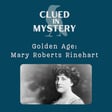
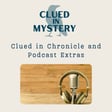
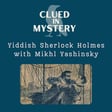
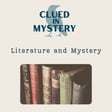
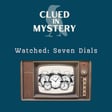
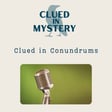
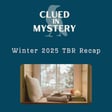
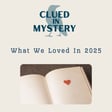
![[Re-release] Anthony Berkeley image](https://media.zencastr.com/cdn-cgi/image/width=112,quality=85/image-files/61e1c276e3ec42007857cff9/e7c778ac-a2ba-4809-9a5c-7cd39d167834.jpg)
![[Bonus] Wake Up Dead Man image](https://media.zencastr.com/cdn-cgi/image/width=112,quality=85/image-files/61e1c276e3ec42007857cff9/e276ac32-e664-464f-956c-7699bdb60aa5.jpg)


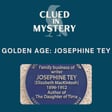
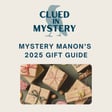
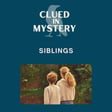

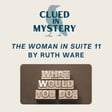
![[Bonus] Read Along: Daughter of Time image](https://media.zencastr.com/cdn-cgi/image/width=112,quality=85/image-files/61e1c276e3ec42007857cff9/b953ad72-c43e-48ca-a18a-b3c216ab90ee.jpg)
